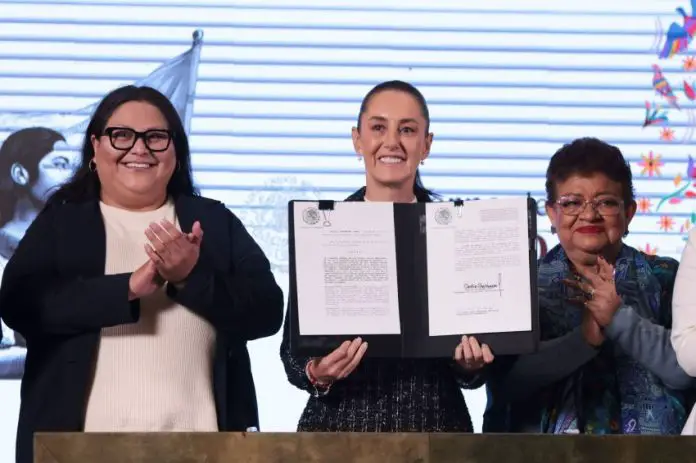President Claudia Sheinbaum on Friday signed into law a constitutional amendment that enshrines a range of rights for Mexican women.
“Women are now in the constitution, our rights are guaranteed,” Sheinbaum said at her morning press conference after endorsing the Substantive Equality reform that was previously approved by both house of federal Congress and ratified by a majority of state legislatures.
“… There is recognition of historical inequality,” she said.
The reform, which modifies seven articles of the Mexican Constitution, will take effect after it is published in the government’s official gazette on Friday.
Among its objectives are to:
- Guarantee women’s right to live a life free of violence.
- Eradicate the gender pay gap.
- Ensure that gender perspective is taken into account in public security initiatives and by judges.
- Guarantee’s women’s right to access opportunities such as education and employment.
- Increase gender parity in government departments at the federal, state and municipal level.
New prosecutor’s offices that focus on investigating and prosecuting crimes against women will be created as a result of the enactment of the reform and the federal government will have new powers to offer protection measures to female victims of crime.

Women’s Minister Citlalli Hernández described the modifications to the constitution as “historic.”
The equality reform serves as “an example” to both the region of which Mexico is part and the world, she said.
Hernández as well as Ernestina Godoy, the president’s top legal adviser, and lawmakers with the ruling Morena party stood alongside Sheinbaum — Mexico’s first female president — when she signed the decree to promulgate the reform.
The reform “will guarantee girls a different future,” said Deputy Anaís Miriam Burgos Hernández.
Senator Martha Lucía Mícher said that the signing into law of the reform was “a historic wish come true.”
“From our feminist hearts we thank the feminist leader of this country,” she said in reference to Sheinbaum.
The president noted that the government is also working toward the establishment of a national care system consisting of state-run facilities that will provide care services and thus reduce the care-giving burden on women.
“The state must provide conditions so that women can dedicate themselves to other tasks if they wish to do so,” Sheinbaum said.

She said that the care system her government is working to establish will allow women — who more often than not are Mexico’s primary care givers — to “leave their children in a place where they are looked after well.”
Sheinbaum is determined to stand up for the rights of women and girls during her six-year term as president. Her predecessor, Andrés Manuel López Obrador, was accused by some of having a “women problem.”
Mexico is well known as a country where machismo, or chauvinism, is prevalent, and women, on average, earn considerably less than men.
Violence against women is also a major problem in Mexico, with more than 3,500 women killed in 2023.
Announcing the creation of a Ministry of Women earlier this year, Sheinbaum said that her government wants “women’s rights to reach every corner of the country.”
She has declared on various occasions that “it’s time for women” in Mexico and asserts that her ascension to the presidency represents the arrival of all women to a position of power.
With reports from La Jornada, El Sol de México and El País
